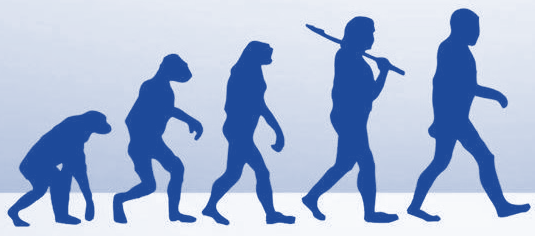Any inquiry into the workings of the human mind must take into account thousands of years of evolutionary development. This trajectory accounts for the acquisition of skills and knowledge as well as the shaping of our moral impulses. Robert Wright provides his views on the latter in his book The Moral Animal: Evolutionary Psychology and Everyday Life.
Charles Darwin revolutionized scientific thought with the publication of his 1859 book On the Origin of Species. He argued that organisms most skilled in adapting to their environments realize the greatest advantage in propagating their genes to succeeding generations. Over time, this advantage translates into fundamental changes in the nature of the populace as a whole; the species evolves. Darwin dubbed this phenomenon natural selection.
Wright argues that natural selection shapes human sensibilities at a subconscious level. The primal urge to pass along our genetic material governs our beliefs, drives our behaviors, and undergirds the social order. As with biology, that which proves most successful in generating progeny persists. That’s Social Darwinism.
Take our mating rituals. A substantial difference in male and female reproductive capabilities creates a delicate negotiation between the sexes. A man’s prodigious capacity to share genetic material compels him to pursue unrestrained copulation. A woman’s limited reproductive capacity argues for selecting mates carefully based on their capacity to make parental investments. Moreover, she wants her offspring to enjoy the benefits of paternal care uncompromised by the products of outside dalliances. Dowries may have been institutionalized to compensate males for narrowing the field of opportunity. Chastity laws most certainly gave males a measure of surety that the offspring to whom they pledged their time and resources perpetuated their genes.
Social Darwinism extends beyond one’s comportment to include preferential treatment for those in our gene pool – i.e., kin selection. It compels us to bestow more kindness, compassion, and generosity on those with whom we are in league to ensure the survival of our lineage. We may even be willing to make sacrifices in their behalf so long as the degree of relatedness overrides the cost of foregone procreative opportunities.
While we favor kin, visible benevolent acts raise our social capital. It sends a message that we are worthy of relationship and establishes a bond of gratitude with the people we serve. Those who maximize friendships and minimize antagonism through reciprocal altruism hold a distinct evolutionary advantage. By contrast, exploitation damages relationship, fosters grievances, and subjects us to public shaming, none of which benefit our procreative agenda.
Hierarchies always appear in groups; the collective ethos determines the “pecking order.” Those higher up on the social ladder have an evolutionary advantage over those beneath them. Traditionally, male hierarchies have been subject to change and challenge; female hierarchies have been more stable and cooperative. The desire for advancement leads to a cognitive bias. It enables us to see ourselves in a flattering light while having a keen sensitivity to other’s flaws. It also gives us the ability to render arguments forcefully without undue concern for the merits of our positions or the presence of inconvenient truths. Winning promotes status and gives our genes a leg up.
Social Darwinism argues that morality takes shape within a context of primal impulses that compel us to advance our genetic material to subsequent generations. Natural selection drives us to be prolific, not virtuous, magnanimous, or happy. So, how does a civil order come into being?
Scientists developed computer simulation models to figure out which behavioral strategy proved most effective in proliferating one’s genes. Dog-Eat-Dog did not win out. Tit-For-Tat proved victorious – i.e., doing unto others as they’ve done unto you. Once established, a system of reciprocal altruism reinforces social cohesion in a way that builds an ever-expanding web of trust. It creates a stable environment for procreative success. However, Tit-For-Tat falters in the context of substantive migration in and out of the group. It also proves ineffective when dropped into a context rife with deceit.
Given all of the foregoing, it’s not surprising that the world’s great religions seek to tame humanity’s animal appetites by challenging their adherents to live in accordance with high moral ideals and surround themselves with the faithful. It creates a peaceable kingdom and confers a genetic advantage. This advantage gains momentum with expansion in the collective of followers.
I realize that there may be a thin line connecting Social Darwinism to this site’s theme of healthy living. Twenty-first century humanity is a far cry from the hunter-gatherer societies that characterized the overwhelming majority of our time on earth. Yet, I think there’s merit in being aware of the extent to which primal instincts play a role in our cultural, ethnic, racial, religious, and gender biases. We can see their underpinnings and call upon ourselves to rise above them. We can also appreciate the merits of reciprocal altruism and adopt the practice in our daily lives.
